
Journal Menu
► ▼ Journal Menu-
- Animals Home
- Aims & Scope
- Editorial Board
- Reviewer Board
- Topical Advisory Panel
- Instructions for Authors
- Special Issues
- Topics
- Sections & Collections
- Article Processing Charge
- Indexing & Archiving
- Editor’s Choice Articles
- Most Cited & Viewed
- Journal Statistics
- Journal History
- Journal Awards
- Society Collaborations
- Conferences
- Editorial Office
Journal Browser
► ▼ Journal BrowserNeed Help?
Announcements
4 June 2025
Interview with Prof. Dr. Bo Zhou—Winner of the Animals 2024 Outstanding Reviewer Award
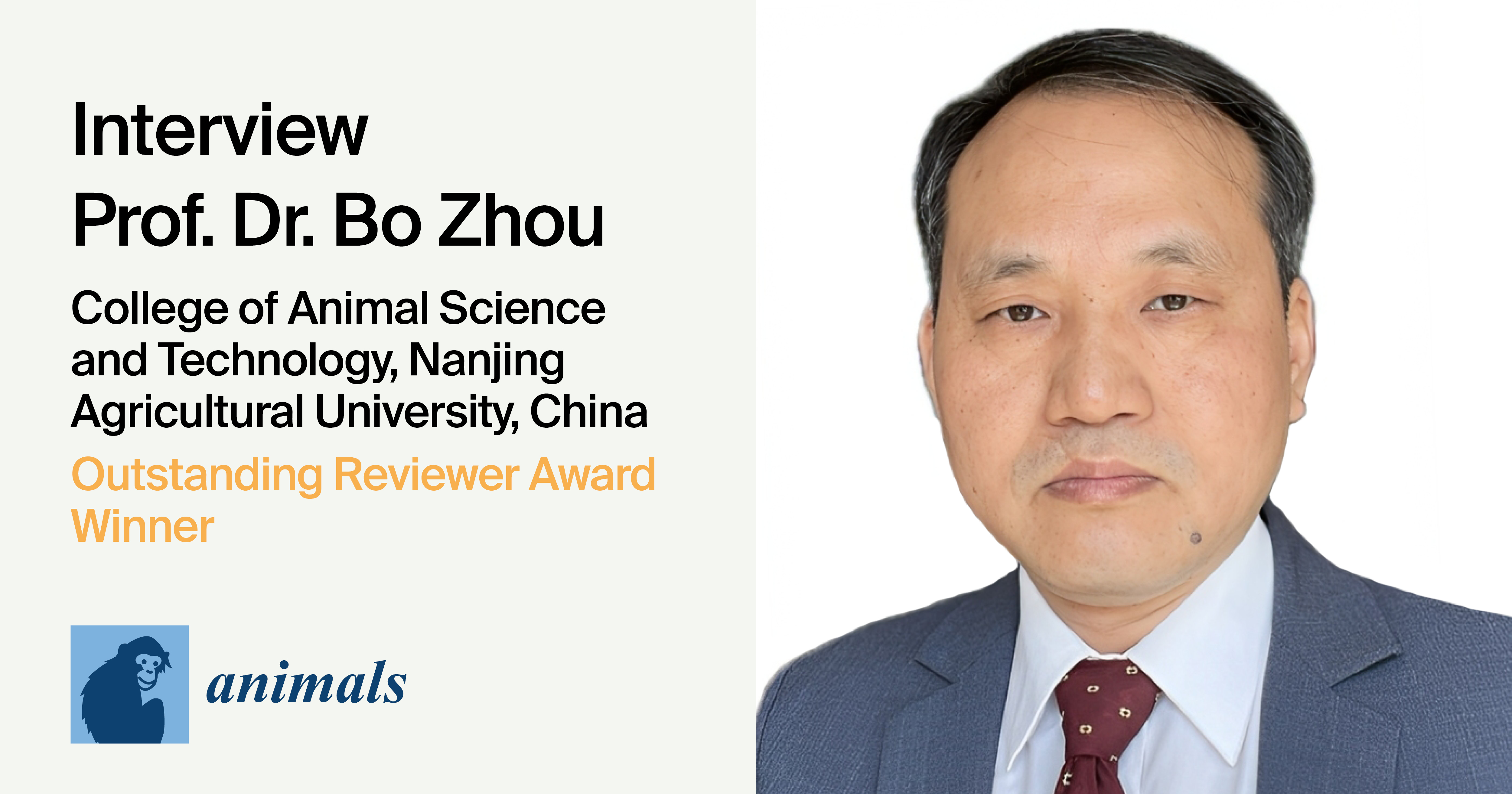
We are pleased to announce that Prof. Dr. Bo Zhou is one of the winners of the Animals 2024 Outstanding Reviewer Award. The Animals Outstanding Reviewer Award is presented annually to recognize reviewers who contribute their time to reviewing papers and display thoroughness, professionalism, and timeliness while doing so.
We are honored to have had the opportunity to interview Prof. Dr. Bo Zhou, providing an opportunity to delve deeper into his research journey and his insights into being a reviewer.
1. Could you please provide a brief introduction of yourself to our readers and give an overview of your current research?
I'm a professor at the College of Animal Science and Technology of Nanjing Agricultural University. I teach and perform some scientific research. My research direction mainly focuses on the genetic breeding and reproduction of pigs and new technologies of intelligence in pig farming in particular; it focuses on the screening of molecules and markers of pig aggression and the analysis of molecules, genetic mechanisms, and the molecular genetic regulation of cell entrance behavior.
2. What led you to review for Animals? How did you hear about the journal?
The Animals journal is a famous journal in my field. It has a top JCR ranking and Impact Factor. I am also an author who has submitted to Animals. I received some email correspondence that encouraged me to review. After reviewing papers for Animals, I received some vouchers that can be used for my papers, so this is a motivation to be a reviewer for this journal.
3. How do you approach the peer review process to ensure fairness and constructive feedback? What are the key factors and aspects that you consider most when reviewing a manuscript?
First, I focus on the purpose of the paper, its aims and direction. Then, the materials and methods section. All aspects of the paper have to be considered to maintain balance in the review report. Sometimes, I receive a review request invitation for a paper that is not within my exact research focus. In this case, I have to study this field and do some research beforehand in order to provide a high-quality review report. It is a lot of work and takes quite a lot of time, too. After gaining this knowledge, you can give some good suggestions to authors. As a reviewer, I can also learn a lot this way.
4. What are the biggest challenges you face as a reviewer, and what are your tips for preparing a high-quality review report?
Preparing a high-quality review requires careful planning. You have to start with a lot of preparations—read the abstract, introduction, and conclusions to get the research idea and get familiar with the hypotheses. You need to learn more deeply and give some thought to the parts that need to be revised and give the authors your suggestions. For a high-quality review report, suggestions need to be more detailed, and you should tell the authors which line or paragraph they need to revise and how to revise it in the best way. You need to give precise suggestions, so you stand on the same ground as the authors.
5. We hope that the Outstanding Reviewer Award will open new opportunities for you. How does an award like this help to support the career of a researcher such as yourself?
Yes, this is strong support from the journal. This award can give me a chance to enrich my academic profile and can give more recognition to my scientific work in the community. It is very important. I shared the information about receiving this award across my social media, and many people showed their support and acknowledgement of my academic work.
6. What advice would you give to aspiring researchers looking to make a meaningful impact in their fields? What qualities do you think young scientists need?
For young researchers, my advice is to first focus on unsolved questions in science. Also, being flexible to do a lot of preparation to explore a certain research field and being open to adapting to other disciplines. It is important to be open to learning a lot on the way. I always recommend my Ph.D. students to read a lot of papers—it is the quickest way to learn how to write a scientific article and gain the necessary experience for the future.
7. Animals is an open access journal. How do you think open access publishing benefits authors and the broader research community?
Animals, as an open access journal, is very fast to publish papers. It’s free for readers, so it’s a good source of knowledge for researchers. Everybody can access the newest research articles. Easy access to the latest research is very important. I think that the publishing fee for Animals is the average amount compared to other publishers, which is good for researchers who want to publish in this journal. What is great is that reviewers can gain discounts that decrease the publishing fee, and scholars can save a lot of money by receiving these vouchers. Researchers want to publish in good-quality journals to find the right home for their papers. The Animals journal’s ranking and Impact Factor are proof of a good paper quality. It is important to maintain this quality.
3 June 2025
MDPI INSIGHTS: The CEO's Letter #23 - MDPI Summits Spain & Italy, Ei Compendex, and Editorial Independence

Welcome to the MDPI Insights: The CEO's Letter.
In these monthly letters, I will showcase two key aspects of our work at MDPI: our commitment to empowering researchers and our determination to facilitating open scientific exchange.
Opening Thoughts

Highlights from the MDPI Spain Summit in Barcelona (21-22 May)
In May we hosted the MDPI Spain Summit in Barcelona – our second summit in the city following the inaugural one in November 2023.

Stefan Tochev (CEO, MDPI) at the MDPI Spain Summit in Barcelona, 22 May 2025.
Creating a space for exchange of views
The goal of our summits is to bring together Chief Editors of MDPI journals from across disciplines and institutions. These intimate gatherings provide a platform to present the latest developments at MDPI and to initiate open conversations about our journals, the future of open access, and the evolving landscape of scientific publishing.
Most importantly, these are opportunities for in-person connection, providing a more meaningful space for the exchange of views and for building long-term relationships.
Exploring the future of scientific publishing in Spain
The summit took place on 21–22 May and featured a mix of MDPI presentations (including two guest presentations), roundtable discussions, and Q&A sessions. On the first day, we held a focused session with our Chief Editors to gather feedback and have open discussions on their journal development, the peer-review process, and local accreditation systems.

Dr. Giulia Stefenelli (Scientific Communications Lead, MDPI, presents MDPI’s Editorial Process and Peer Review Quality Metrics at the MDPI Spain Summit in Barcelona, 22 May 2025.
I had the pleasure of opening the Summit with a welcome address and an overview of MDPI’s recent milestones. The agenda then included the following sessions:
- MDPI and Recent Developments in the Spanish Market – Dr. Marta Colomer (Public Affairs Specialist, MDPI)
- MDPI Editorial Process and Peer Review Quality Metrics – Dr. Giulia Stefenelli (Scientific Communications Lead, MDPI)
- Open Access in Spain – Dr. Remedios Melero (Researcher, CSIC – guest speaker)
- AI in Publishing and MDPI's Actions – Dr. Enric Sayas (Business Analyst, MDPI), Daniele Raimondi (Data Scientist, MDPI), and Dr. Alexandre López-Borrull (Researcher, Universitat Oberta de Catalunya – guest speaker)
- Publication Ethics – Ana Stankovic (Research Integrity and Publication Ethics, MDPI)
- Opening and Closing remarks were provided by Rocksy Zhang (Editorial Director, MDPI)
We are extremely grateful for the strong engagement shown by our Editors, who were clearly appreciative of the event and the discussions we had. They felt seen and heard, which is a vital prerequisite for building open channels of communication and cultivating productive long-term collaborations.

MDPI colleagues during MDPI Spain Summit in Barcelona (22 May 2025).
A big thank-you to the entire Barcelona team for organizing such a successful event!
Upcoming MDPI Summit events:
- Italy Summit – Rome (26–27 May)
- US Summit – Boston, MA (5–6 June)
- France Summit – Paris (12–13 June)
- US Summit – Houston, TX (26–27 June)
- UK Summit – London (16–17 September)
- Germany Summit – Berlin (18–19 September)
- Romania Summit – Bucharest (23–24 October)
...with more in between, and more to follow.
Impactful Research

50 MDPI Journals Now Indexed in Ei Compendex
Indexing is a key indicator of a journal’s scientific impact. An indexed journal gives research greater visibility and credibility within the global academic community and is recognized for its quality and relevance. While many of our journals are included in major databases such as Web of Science and Scopus, MDPI also places strong emphasis on journal inclusion in subject-specific indexing platforms that align with each journal’s scope. This ensures that when you publish with MDPI, you publish with impact.
I’m pleased to share that as at May 2025, 51 of our journals are now indexed in Ei Compendex, a leading bibliographic database for engineering and applied sciences. This is a major milestone that reflects both the quality or our editorial processes and the relevance of the research we publish in these fields.
“When you publish with MDPI, you publish with impact”
Discoverability and reach
Inclusion in Ei Compendex means greater discoverability for our authors and broader reach of our journals in the fields of engineering and technology. It improves our ability to support global research and innovation, while building MDPI’s reputation in the applied sciences. This recognition is the result of the dedicated work of our editorial teams, reviewers, and authors, and of our overall commitment to excellence in publishing.
You can read our full announcement here.
Appreciative thanks to everyone involved in reaching this milestone.
Inside MDPI
One Year of MDPI’s Seoul Office
On 29 April, we marked one year since the opening of our Seoul office, MDPI’s first local hub in South Korea. South Korea is a key market for MDPI, currently ranking as our sixth-largest contributor to the company’s total publications, with over 89,000 MDPI articles authored by individuals affiliated with Korean institutions. Over the past 12 months, the Seoul team has made great strides in building our visibility, networks, and presence in the region.
A few highlights from the past year

Claude Seo (MDPI Korea Office Manager, Seoul)
Claude Seo, who has over 15 years of experience in the academic publishing industry, is the Office Manager of the Seoul office.
In its inaugural year, the Seoul office focused primarily on marketing and promotional activities to support the MDPI brand locally. During that time, the team concentrated on scholar visits to local institutions, attending academic conferences, and hosting editorial board meetings.
The team also secured 10 Institutional Open Access Program (IOAP) renewals, signed three new IOAP agreements, and established one new Society affiliation.
The Seoul office also hosted its first library book fair and reached over 1,000 followers on its LinkedIn channel, which is an encouraging indication of local visibility and engagement.
“The Seoul team has made strides in building our visibility, networks, and presence in the region”
Growth plans
Later this year, we are working on opening a new Seoul office in a more central location, with room for our growing team. The new space will bring us closer to other publishing partners and provide easier access to and from the airport. The Seoul office will continue to expand its efforts in outreach and engagement as its builds its presence in South Korea.
Warm thanks to the entire Seoul team for their hard work and dedication, and to all MDPI colleagues who have contributed to this exciting chapter in our global journey.
Coming Together for Science

Highlights from the MDPI Italy Summit in Rome (26–27 May)
We closed the month of May by hosting the first MDPI Italy Summit in Rome. This was an important event for us, as Italy has consistently ranked among the top ten countries globally for open access publications over the past decade.
MDPI and Italy: Facts & Figures
- With over 144,000 publications (as at 31 May 2025), Italy is MDPI’s third largest contributor after China and the USA.
- In 2024, MDPI was the second-largest publishing house in Italy.
- The 7,165 Editorial Board Members (EBMs) drawn from Italian institutions represent 8.9% of all MDPI academic editors.
- Among these, 319 serve as Editors-in-Chief (EiCs) or Section Editors-in-Chief (SEiCs).
- Eleven Italian EBMs were recognized as 2024 Clarivate Highly Cited Researchers.
- In 2024, MDPI received 24,873 review reports and collaborated with 88,578 reviewers from Italy.
- 23,131 Guest Editors from Italian institutions led 4,827 Special Issues across 248 MDPI journals.
- MDPI partners with over 900 institutions globally, of which 17 are in Italy.
The MDPI Italy Summit in Rome

Dr. Prof. Giulio Cerullo, EiC of Applied Sciences, at the MDPI Italy Summit in Rome (27 May 2025).
Held on 26–27 May, the MDPI Italy Summit brought together 25 Chief Editors from across our journal portfolio, including some of our largest journals such as Applied Sciences, to discuss MDPI’s latest developments and collaborations in the Italian market, our use of data intelligence and AI to support strategic decision-making, a look into our editorial process, peer-review quality metrics, and conversations around research integrity and community engagement.
The Summit featured MDPI presentations followed by Q&A and concluded with a roundtable discussion. On the evening of the 26th, we hosted a dinner with our Editors to connect personally, learn more about their research, and hear feedback on journal operations and the broader academic landscape in Italy.

Gathering of Editors-in-Chief and MDPI staff at the MDPI Italy Summit in Rome (27 May 2025).
Event Agenda – 27 May
Moderated by Maddalena Favaretto (Conference Scientific Advisor, MDPI), the program featured:
- MDPI Overview, Achievements, Latest News and Future Developments – Stefan Tochev (CEO, MDPI)
- Country Report: Italy – Dr. Laura Perez Martin (Conference Assistant, MDPI)
- AI in Publishing and MDPI’s Actions – Dr. Andrea Perlato (Head of Data Analytics, MDPI)
- MDPI Editorial Process and Research Integrity – Dr. Giulia Stefenelli (Scientific Communications Lead, MDPI)
- Panel Discussion – Stefan, Andrea, Giulia

Panel Discussion with Stefan Tochev (CEO, MDPI), Dr. Giulia Stefenelli (Scientific Communications Lead, MDPI), Dr. Andrea Perlato (Head of Data Analytics, MDPI) during the MDPI Italy Summit in Rome (27 May 2025).
A big thank-you to our Conference team and everyone who worked behind the scenes to make these events run smoothly.
Closing Thoughts

Upholding Editorial Independence in Scholarly Publishing
A recent MDPI blog post written by Dr. Ioana Craciun (Scientific Communications Specialist, MDPI), “Editorial Independence and Publisher Support: Collaborating to Uphold Integrity,” highlights the important balance between editorial autonomy and publisher collaboration in academic publishing.
As the leading fully Open Access scholarly publisher, we are proud to champion editorial independence within our publishing process.
Drawing from the Committee on Publication Ethics (COPE) guidelines, the article emphasizes that while editors must have the freedom to make decisions based on scholarly merit, publishers play a critical role in providing the necessary infrastructure and tools to support the editorial process. This collaborative approach ensures the integrity of the peer review process, builds trust among authors and readers, and upholds the quality and relevance of published content.
MDPI highlights its commitment to this model by investing in research integrity specialists, AI tools for plagiarism detection, and administrative support, all aimed at empowering editors to make independent, informed decisions.
Chief Executive Officer
MDPI AG
26 May 2025
Animals | Top Cited Papers in 2023
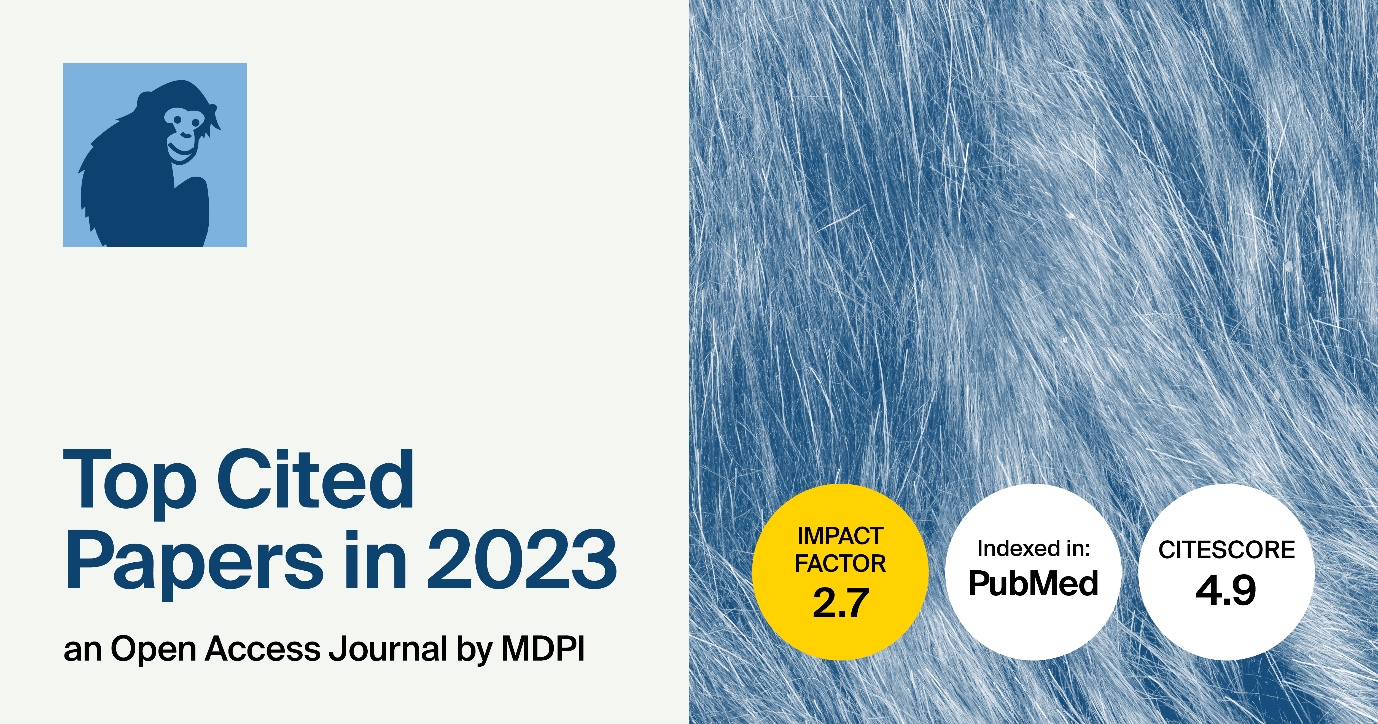
Animals (ISSN: 2076-2615) is an international, peer-reviewed, and open access journal established in 2011 and published semi-monthly online by MDPI. The journal is dedicated to high-quality research across a broad range of animal-related disciplines, including zoology and veterinary sciences, and upholds rigorous peer review as well as editorial standards to ensure the publication of impactful work. We welcome you to read our top cited papers published in 2023:
1. “Valorization of Food Waste as Animal Feed: A Step towards Sustainable Food Waste Management and Circular Bioeconomy”
by Pinku Chandra Nath, Amiya Ojha, Shubhankar Debnath, Minaxi Sharma, Prakash Kumar Nayak, Kandi Sridhar and Baskaran Stephen Inbaraj
Animals 2023, 13(8), 1366; https://doi.org/10.3390/ani13081366
Available online: https://www.mdpi.com/2076-2615/13/8/1366
2. “Heat Shock Protein Response to Stress in Poultry: A Review”
by Krishnan Nair Balakrishnan, Suriya Kumari Ramiah and Idrus Zulkifli
Animals 2023, 13(2), 317; https://doi.org/10.3390/ani13020317
Available online: https://www.mdpi.com/2076-2615/13/2/317
3. “Microplastics in Terrestrial Domestic Animals and Human Health: Implications for Food Security and Food Safety and Their Role as Sentinels”
by Joana C. Prata and Patrícia Dias-Pereira
Animals 2023, 13(4), 661; https://doi.org/10.3390/ani13040661
Available online: https://www.mdpi.com/2076-2615/13/4/661
4. “Effect of Dietary Organic Acids and Botanicals on Metabolic Status and Milk Parameters in Mid–Late Lactating Goats”
by Andrea Giorgino, Federica Raspa, Emanuela Valle, Domenico Bergero, Damiano Cavallini, Marta Gariglio, Valentina Bongiorno, Giorgia Bussone, Stefania Bergagna, Francesca Cimino et al.
Animals 2023, 13(5), 797; https://doi.org/10.3390/ani13050797
Available online: https://www.mdpi.com/2076-2615/13/5/797
5. “Hematological and Hematopoietic Analysis in Fish Toxicology—A Review”
by Małgorzata Witeska, Elżbieta Kondera and Bartosz Bojarski
Animals 2023, 13(16), 2625; https://doi.org/10.3390/ani13162625
Available online: https://www.mdpi.com/2076-2615/13/16/2625
6. “Nutritional Strategies to Improve Meat Quality and Composition in the Challenging Conditions of Broiler Production: A Review”
by Janghan Choi, Byungwhi Kong, Brian C. Bowker, Hong Zhuang and Woo Kyun Kim
Animals 2023, 13(8), 1386; https://doi.org/10.3390/ani13081386
Available online: https://www.mdpi.com/2076-2615/13/8/1386
7. “The Impact of Human Activities on Zoonotic Infection Transmissions”
by Michelle Marie Esposito, Sara Turku, Leora Lehrfield and Ayat Shoman
Animals 2023, 13(10), 1646; https://doi.org/10.3390/ani13101646
Available online: https://www.mdpi.com/2076-2615/13/10/1646
8. “The Economic Impact of Parasitism from Nematodes, Trematodes and Ticks on Beef Cattle Production”
by Tom Strydom, Robert P. Lavan, Siddhartha Torres and Kathleen Heaney
Animals 2023, 13(10), 1599; https://doi.org/10.3390/ani13101599
Available online: https://www.mdpi.com/2076-2615/13/10/1599
9. “Old Antibiotics Can Learn New Ways: A Systematic Review of Florfenicol Use in Veterinary Medicine and Future Perspectives Using Nanotechnology”
by Emilia Trif, Constantin Cerbu, Diana Olah, Sergiu Dan Zăblău, Marina Spînu, Adrian Valentin Potârniche, Emoke Pall and Florinel Brudașcă
Animals 2023, 13(10), 1695; https://doi.org/10.3390/ani13101695
Available online: https://www.mdpi.com/2076-2615/13/10/1695
10. “Impact of Microplastics and Nanoplastics on Livestock Health: An Emerging Risk for Reproductive Efficiency”
by Susy Urli, Francesca Corte Pause, Martina Crociati, Anja Baufeld, Maurizio Monaci and Giuseppe Stradaioli
Animals 2023, 13(7), 1132; https://doi.org/10.3390/ani13071132
Available online: https://www.mdpi.com/2076-2615/13/7/1132
22 May 2025
Topics Webinar | Ticks and Tick-Borne Pathogens: Understanding Risks and Strategies for Prevention, 21 May 2025
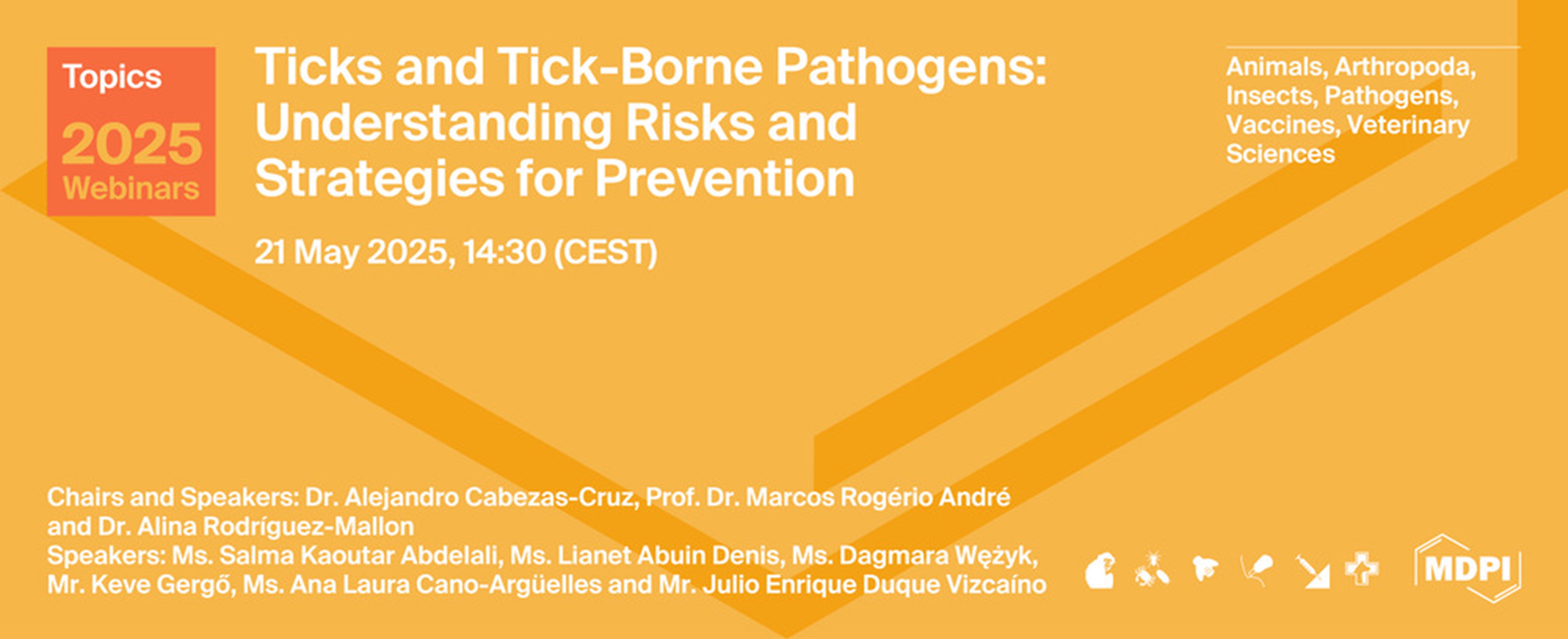
A message from the webinar Chair:
We invite you to join our upcoming webinar on the topic of ticks and tick-borne pathogens. The main goal of this webinar is to summarize the first volume of our Special Topic on MDPI journals which were part of the sponsorship of this editorial to the TTP11 Conference and to promote the second volume of this Topic which was set very recently following the success of the previous volume. This second volume continues to provide a platform for showcasing groundbreaking research, innovative methodologies, and promising discoveries in various facets of tick biology. The webinar will be organized into three key topics, with a talk from a senior researcher and two presentations from Ph.D. students actively working on each topic:
- Tick microbiota;
- Latest trends in ticks and tick-borne disease surveillance;
- Effective prevention and control strategies.
Do not miss out on this opportunity to enhance your knowledge and stay updated on these important topics that are on the rise, making awareness and prevention more critical than ever. We encourage you to participate actively and submit your questions during the webinar.
Webinar: Ticks and Tick-Borne Pathogens: Understanding Risks and Strategies for Prevention
Date: 21 May 2025
Time: 2.30 p.m. CEST | 8.30 a.m. EDT | 8.30 p.m. CDT Asia
Webinar ID: 832 6108 8276
More information: https://sciforum.net/event/topics-35
This is a free webinar. After registration, you will receive a confirmation email on how to join the webinar. Registrations with academic institutional email addresses will be prioritized.
Unable to attend? Register anyway, and we will let you know when the recording becomes available for viewing.
Register for free:
Program:
|
Speaker/Presentation |
Time in CEST |
Time in EDT |
Time in CDT Asia |
|
Dr. Alejandro Cabezas-Cruz |
14:30–14:35 |
08:30–08:35 |
20:30–20:35 |
|
Ms. Salma Kaoutar Abdelali |
14:35–14:45 |
08:35–08:45 |
20:35–20:45 |
|
Ms. Lianet Abuin Denis |
14:45–14:55 |
08:45–08:55 |
20:45–20:55 |
|
Dr. Alejandro Cabezas-Cruz |
14:55–15:15 |
08:55–09:15 |
20:55–21:15 |
|
Q&A Session |
15:15–15:25 |
09:15–09:25 |
21:15–21:25 |
|
Ms. Dagmara Wężyk |
15:25–15:35 |
09:25–09:35 |
21:25–21:35 |
|
Mr. Keve Gergő |
15:35–15:45 |
09:35–09:45 |
21:35–21:45 |
|
Prof. Dr. Marco Rogério André |
15:45–16:05 |
09:45–10:05 |
21:45–22:05 |
|
Q&A Session |
16:05–16:15 |
10:05–10:15 |
22:05–22:15 |
|
Ms. Ana Laura Cano-Argüelles |
16:15–16:25 |
10:15–10:25 |
22:15–22:25 |
|
Mr. Julio Enrique Duque Vizcaíno |
16:25–16:35 |
10:25–10:35 |
22:25–22:35 |
|
Dr. Alina Rodríguez-Mallon |
16:35–16:55 |
10:35–10:55 |
22:35–22:55 |
|
Q&A Session |
16:55–17:05 |
10:55–11:05 |
22:55–23:05 |
|
Dr. Alejandro Cabezas-Cruz |
17:05–17:15 |
11:05–11:15 |
23:05–23:15 |
Webinar Chairs and Speakers:
- Dr. Alejandro Cabezas-Cruz, UMR BIPAR (INRAE, Anses, EnvA), France;
- Dr. Alina Rodríguez-Mallon, Center for Genetic Engineering and Biotechnology (CIGB), Havana, Cuba;
- Ms. Salma Kaoutar Abdelali, University of Ferhat Abbas, Algeria;
- Ms. Lianet Abuin Denis, Center for Genetic Engineering and Biotechnology (CIGB), Havana, Cuba;
- Ms. Dagmara Wężyk, University of Warsaw, Poland;
- Mr. Keve Gergő, University of Veterinary Medicine Budapest, Hungary;
- Ms. Ana Laura Cano-Argüelles, Institute of Natural Resources and Agrobiology of Salamanca (IRNASA, CSIC), Spain;
- Mr. Julio Enrique Duque Vizcaíno, Center for Genetic Engineering and Biotechnology (CIGB), Cuba).
Relevant Special Issue:
“Ticks and Tick-Borne Pathogens: 2nd Edition”
Topic Editors: Dr. Alina Rodríguez-Mallon and Dr. Alejandro Cabezas-Cruz
Deadline for submission: 31 March 2026
21 May 2025
International Day for Biological Diversity—“Harmony with Nature and Sustainable Development”, 22 May 2025
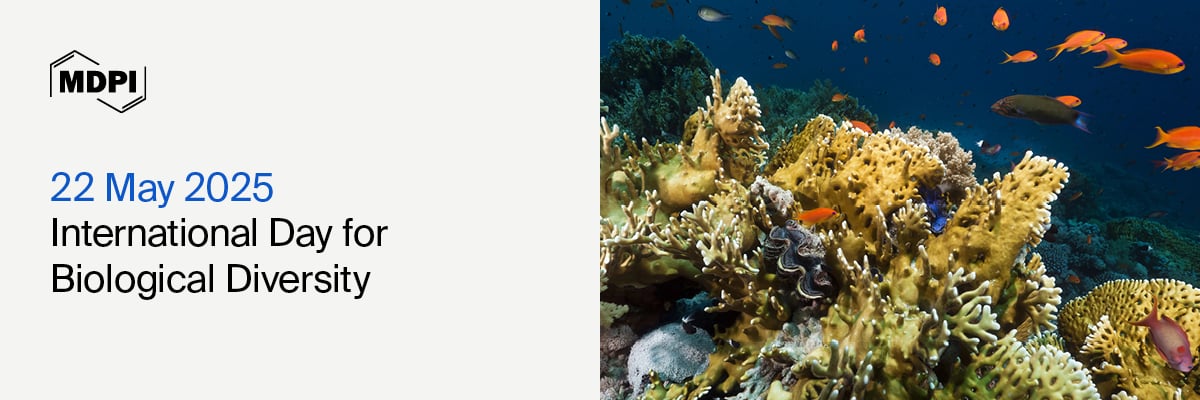
International Day for Biological Diversity is an annual observance aimed at enhancing awareness and fostering a deeper appreciation of the value of biodiversity, while also drawing attention to the pressing threats it faces on a global scale. This day highlights the pivotal role that biodiversity plays in maintaining planetary health and human well-being, thereby reinforcing the imperative for its conservation. Under the theme “Harmony with Nature and Sustainable Development”, the International Day for Biological Diversity emphasizes the intricate interdependence between all living organisms and their ecosystems.
We hope that established journals in the subjects of Biology & Life Sciences and Environmental & Earth Sciences at MDPI will continue to provide a platform for scientists, researchers, and policymakers to share their findings and insights.

|
“Biology & Life Sciences” |
|
“Environmental & Earth Sciences” |
|
||
|

“Refining Camera Trap Surveys for Mammal Detection and Diversity Assessment in the Baviaanskloof Catchment, South Africa”
by Maya Beukes, Travis Perry, Daniel M. Parker and Nokubonga Mgqatsa
Wild 2025, 2(2), 15; https://doi.org/10.3390/wild2020015
“The Endangered and Protected Carabus hungaricus Fabricius, 1792 (Coleoptera: Carabidae) in Bulgaria: Distributional Patterns and Conservation Status”
by Teodora M. Teofilova and Nikolay D. Kodzhabashev
Conservation 2025, 5(2), 18; https://doi.org/10.3390/conservation5020018
“The Multifunctional Catalytic Hemoglobin from Amphitrite ornata: Protocols on Isolation, Taxonomic Identification, Protein Extraction, Purification, and Characterization”
by Anna L. Husted, Victoria R. Sutton, Lauren A. Presnar, R. Kevin Blackburn, Joseph L. Staton, Stephen A. Borgianini and Edward L. D’Antonio
Methods Protoc. 2024, 7(6), 100; https://doi.org/10.3390/mps7060100
“Genetic Diversity, Runs of Homozygosity, and Selection Signatures in Native Japanese Chickens: Insights from Single-Nucleotide Polymorphisms”
by Vanessa V. Velasco, Masaoki Tsudzuki, Norikazu Hashimoto, Naoki Goto and Akira Ishikawa
Animals 2024, 14(22), 3341; https://doi.org/10.3390/ani14223341
“Exploring Extremotolerant and Extremophilic Microalgae: New Frontiers in Sustainable Biotechnological Applications”
by Dorian Rojas-Villalta, David Rojas-Rodríguez, Melany Villanueva-Ilama, Rossy Guillén-Watson, Francinie Murillo-Vega, Olman Gómez-Espinoza and Kattia Núñez-Montero
Biology 2024, 13(9), 712; https://doi.org/10.3390/biology13090712
“Toward Understanding Research Evolution on Indirect Drivers of Ecosystem Change along the Interface of Protected and Non-Protected Lands”
by Trace Gale and Andrea Báez Montenegro
Sustainability 2024, 16(17), 7572; https://doi.org/10.3390/su16177572
“Effects of Long-Term Application of Nitrogen Fertilizer on Soil Acidification and Biological Properties in China: A Meta-Analysis”
by Liqiang Zhang, Zehang Zhao, Bailing Jiang, Bate Baoyin, Zhengguo Cui, Hongyu Wang, Qiuzhu Li and Jinhu Cui
Microorganisms 2024, 12(8), 1683; https://doi.org/10.3390/microorganisms12081683
“Systematic Distribution of Bioluminescence in Marine Animals: A Species-Level Inventory”
by Julien M. Claes, Steven H. D. Haddock, Constance Coubris and Jérôme Mallefet
Life 2024, 14(4), 432; https://doi.org/10.3390/life14040432
“Rambellisea gigliensis and Rambellisea halocynthiae, gen. et spp. nov. (Lulworthiaceae) from the Marine Tunicate Halocynthia papillosa”
by Martina Braconcini, Susanna Gorrasi, Massimiliano Fenice, Paolo Barghini and Marcella Pasqualetti
J. Fungi 2024, 10(2), 127; https://doi.org/10.3390/jof10020127
“The Responses of Cladoceran Communities to the Single and Simultaneous Effects of Environmentally Relevant Increases in Temperature and Phosphorus Concentration in Freshwater Ecosystems”
by Małgorzata Adamczuk
Water 2024, 16(2), 249; https://doi.org/10.3390/w16020249
“The Lost and Found: Unraveling the Functions of Orphan Genes”
by Ali Zeeshan Fakhar, Jinbao Liu, Karolina M. Pajerowska-Mukhtar and M. Shahid Mukhtar
J. Dev. Biol.2023, 11(2), 27; https://doi.org/10.3390/jdb11020027

|
“Monitoring, Restoration and Protection in Wetland Ecosystems” |
“Insect Adaptation in the Anthropocene: Responses to Contamination and Human-Induced Environmental Changes” |
 |
 |
|
“Plants and Habitats in Changing World: New Data for Climate Change Interpretation and Sustainable Management” |
“Fungal Diversity in Various Environments, 4th Edition” |
 |
 |
|
“Impacts of Climate Change on Terrestrial Carbon Cycling and Biodiversity Across Spatial and Temporal Scales” |
“Salmonid Fishery Management and Its Interactions with Freshwater Ecosystem Functions, Structures, and Services” |
 |
 |
|
“Plant–Soil Interactions Under Global Change” |
“Plant Species Diversity and Conservation” |
 |
 |
21 May 2025
Empowering Academic Growth with MDPI Scientific Publishing Exchange at Chulalongkorn University, 26 May 2025, Bangkok, Thailand

We are delighted to announce a scientific publishing exchange organized by Animals (ISSN: 2076-2615) in partnership with Chulalongkorn University, Thailand. Participants will explore cutting-edge strategies for navigating the peer review process, refine their manuscript preparation techniques to enhance publication impact, and engage in interactive discussions with editors.
Animals and Chulalongkorn University are proud to offer this unique platform for early-career researchers to elevate their publishing expertise. We encourage you to seize this opportunity, which could be a pivotal step in expanding your academic influence and research visibility.
Date: 26 May 2025
Time: 8.30–12.00 a.m.
Location: Demonstration Room, 1st Floor, Faculty of Veterinary Science, Chulalongkorn University
Registration: https://www.surveymonkey.com/r/F5XJKPN
|
Speaker |
Program |
Time |
|
Prof. Dr. Nopadon Pirarat (Chair) |
Opening Speech |
8.30–8:40 a.m. |
|
Dr. Juthathip Poofery |
MDPI and Animals Journal Introduction |
8:40–9:00 a.m. |
|
Dr. Krit Inthajak |
How to Write Scientific Papers
|
9:00–9:30 a.m. |
|
|
Q&A Session |
9:30–9:40 a.m. |
|
Ms. Hathaipat Kittirojana |
How to Respond to Peer Reviewers and Reasons for Rejection during Pre-Check |
9:40–10:10 a.m. |
|
|
Q&A Session |
10:10–10:20 a.m. |
|
Mr. Suvicha Sasivimolkul |
Understanding Data Visualization in Academic Papers
|
10:20–10:40 a.m. |
|
|
Q&A Session |
10:40–10:50 a.m. |
|
Ms. Ploy Assavajamroon |
Artificial Intelligence in Scientific Publishing
|
10:50–11:10 a.m. |
|
|
Q&A Session |
11:10–11:20 a.m. |
|
Mr. Aleksandar Djukic |
Animal Ethics and Research Integrity
|
11:20–11:50 a.m.
|
|
|
Q&A Session |
11:50–12:00 a.m. |
|
Chair: |
Biography |
|
Prof. Dr. Nopadon Pirarat Director, VST and WEAP-CE of Faculty of Veterinary Science, Chulalongkorn University |
Prof. Dr. Nopadon Pirarat is a faculty member at Chulalongkorn University, Thailand, where he serves as the Director of the VST International Graduate Program and the Director of WEAP-CE. He holds a D.V.M. from Chulalongkorn University and a Ph.D. in aquatic bioscience, and has completed a postdoctoral fellowship at the Tokyo University of Marine Science and Technology. His research focuses on fish immunopathology, veterinary pathology, and nanotechnology in aquaculture health. Notably, he has developed nanovaccines utilizing chitosan polymers and lipid carriers to enhance disease resistance in fish, with a particular emphasis on mucoadhesive nanovaccines for improving immunity against Aeromonas veronii and Flavobacterium oreochromis. Additionally, Dr. Pirarat has explored the use of nanostructured lipid carriers to improve the delivery of herbal extracts, such as clove oil, in both aquaculture and veterinary treatments. Dr. Pirarat is also actively involved in international collaborations, including the BactiVac network, which aims to advance vaccine development and immunology research in veterinary science. His education, research contributions, and global collaborations demonstrate his commitment to advancing veterinary science and improving aquaculture health. |
|
Dr. Manoj Tukaram Kamble Center of Excellence in Wildlife, Exotic, and Aquatic Animal Pathology, Faculty of Veterinary Science, Chulalongkorn University |
Dr. Manoj Tukaram Kamble is a Postdoctoral Researcher at the Center of Excellence in Wildlife, Exotic, and Aquatic Animal Pathology, Faculty of Veterinary Science, Chulalongkorn University, Thailand. He holds a Ph.D. in aquaculture and aquatic resources management from the Asian Institute of Technology (AIT), Thailand. His research focuses on the applications of nanotechnology in aquaculture, sustainable aquaculture nutrition, fish health management, and aquatic animal welfare. Dr. Kamble has made notable contributions to the development of nanostructured lipid carriers for delivering phytobiotics, nanoherbal treatments, and disease control strategies in aquaculture. He serves as an Associate Editor for the Journal of the World Aquaculture Society and Guest Editor for Animals (MDPI). Dr. Kamble has received several international awards for his research and has co-edited books on sustainable aquaculture practices. His work integrates advanced technologies to enhance fish health, nutrition, and sustainability in aquaculture systems. |
MDPI speakers:
|
Dr. Juthathip Poofery |
Dr. Juthathip Poofery holds a Ph.D. in biochemistry from the Faculty of Medicine, Chiang Mai University, Thailand. She began working at MDPI in 2021 as an Assistant Editor for Medicina and advanced to the position of Section Managing Editor in 2022. Since 2023, Dr. Poofery has been serving as the Group Leader of the “Medical Science” Section, where she oversees editorial operations and contributes to the advancement of research in the field. |
|
Dr. Krit Inthajak
|
Dr. Krit Inthajak obtained his Ph.D. in engineering and technology from Sirindhorn International Institute of Technology, Thammasat University, Thailand. He joined MDPI in March 2020 as an Assistant Editor for Molecules. He was appointed as a Section Managing Editor in 2021 and worked as a Group Leader from 2021 to 2024. He is now one of MDPI's Regional Journal Relations Specialists for the Asia–Pacific region. |
|
Ms. Hathaipat Kittirojana |
Ms. Hathaipat Kittirojana obtained her master’s degree in food science and biotechnology from Teesside University, UK. She joined MDPI in December 2020 as an Assistant Editor for the Journal of Imaging. She was appointed as a Section Managing Editor in March 2023 and a Regional Journal Relations Specialist for the Asia–Pacific region in July 2024. |
|
Mr. Suvicha Sasivimolkul |
Mr. Suvicha Sasivimolkul earned his master’s degree in biomedical engineering from Rangsit University, Thailand, in 2021. That same year, he joined MDPI as an Assistant Editor for the journal Crystals. In 2022, he advanced to the role of Section Managing Editor and Training Assistant. In 2023, he became Co-Training Group Leader. He currently serves as the Training Group Leader for MDPI’s Asian offices. |
|
Ms. Ploy Assavajamroon |
Ms. Ploy Assavajamroon obtained her master’s degree in chemistry from Thammasat University, Thailand, in 2020 and joined MDPI as an Assistant Editor for the journal Crystals in the same year. She became a Section Managing Editor in 2021 and a Group Leader in 2022. She is currently one of MDPI's Regional Journal Relations Specialists for the Asia–Pacific region. |
|
Mr. Aleksandar Djukic |
Mr. Aleksandar Djukic obtained his master’s degree in food zoology from Faculty of Sciences, University of Novi Sad, Serbia. He joined MDPI in November 2020 as an Assistant Editor for the journal Animals. He was appointed as a Section Managing Editor in March 2022 and a Journal Relations Specialist for Animals and Ruminants in March 2023. In February 2024, he joined the Research Integrity team, where he currently serves as a Research Integrity Manager. |
20 May 2025
World Bee Day 2025—“Bee Inspired by Nature to Nourish Us All”, 20 May 2025
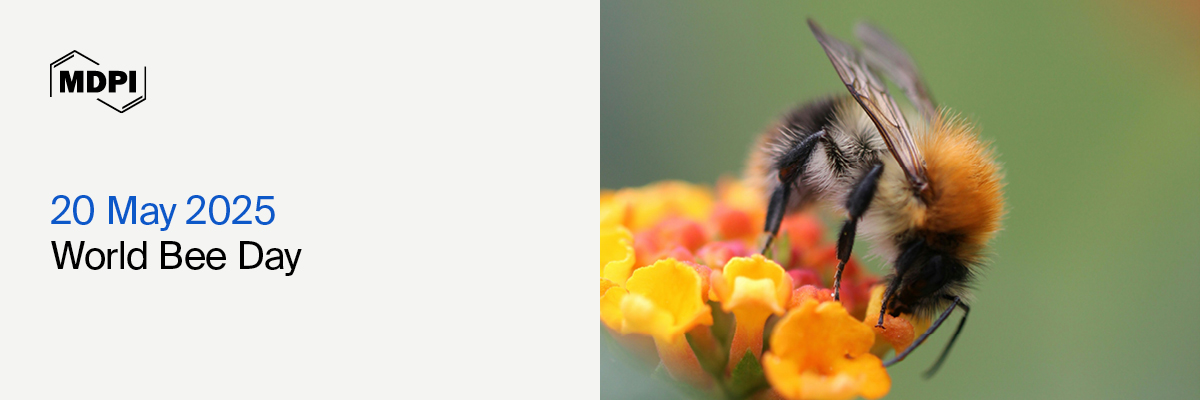
World Bee Day, commemorated annually on the 20th of May, was established to raise public awareness of the importance of bees and other pollinators, as well as to promote the coordinated development of sustainable agriculture and ecological protection. This year's theme is “Bee inspired by nature to nourish us all”. As the most critical pollinator in nature, bees directly influence global crop yields and have a profound impact on food security, biodiversity, and economic value chains. The contributions made by bees and other pollinators are closely connected to all of us. However, due to factors such as habitat destruction, the widespread use of pesticides, and climate change, global bee colonies and other pollinators are experiencing a significant decline in population.
MDPI encourages the use of open academic exchange platforms offered by journals from Biology & Life Sciences subject such as Agriculture, Animals, Biology, Conservation, Ecologies, Foods, Insects and Life to promote innovation and practical application in the field of pollinator protection. Research published in these journals is freely accessible to the public. We look forward to leveraging scientific knowledge to help safeguard this fragile link that sustains the Earth's life-support network.

 |
 |
 |
 |
 |
 |
 |
 |

“Climate Change Influences on Central European Insect Fauna over the Last 50 Years: Mediterranean Influx and Non-Native Species”
by Attila Haris, Zsolt Józan, Péter Schmidt, Gábor Glemba, Bogdan Tomozii, György Csóka, Anikó Hirka, Peter Šima and Sándor Tóth
Ecologies 2025, 6(1), 16; https://doi.org/10.3390/ecologies6010016
“Comparative Study of the Effect of Pollen Substitute Diets on Honey Bees during Early Spring”
by Hyunjee Kim, Olga Frunze, Abdulkadir Yusif Maigoro, Myeong-Lyeol Lee, Jeong-Hyeon Lee
and Hyung-Wook Kwon
Insects 2024, 15(2), 101; https://doi.org/10.3390/insects15020101
“Decoding the Behavior of a Queenless Colony Using Sound Signals”
by Dimitrios Kanelis, Vasilios Liolios, Fotini Papadopoulou, Maria-Anna Rodopoulou, Dimitrios Kampelopoulos, Kostas Siozios and Chrysoula Tananaki
Biology 2023, 12(11), 1392; https://doi.org/10.3390/biology12111392
“Conservation of Local Honeybees (Apis mellifera L.) in Southeastern Turkey: A Preliminary Study for Morphological Characterization and Determination of Colony Performance”
by Atilla Oztokmak, Gonca Ozmen Ozbakir and Oznur Çaglar
Animals 2023, 13(13), 2194; https://doi.org/10.3390/ani13132194
“Survey Results of Honey Bee Colony Losses in Winter in China (2009–2021)”
by Jiao Tang, Congcong Ji, Wei Shi, Songkun Su, Yunbo Xue, Jinshan Xu, Xiao Chen, Yazhou Zhao and Chao Chen
Insects 2023, 14(6), 554; https://doi.org/10.3390/insects14060554
“Application of a Quality-Specific Environmental Risk Index for the Location of Hives in Areas with Different Pollution Impacts”
by Daniel Signorelli, Luigi Jacopo D’Auria, Antonio Di Stasio, Alfonso Gallo, Augusto Siciliano, Mauro Esposito, Alessandra De Felice and Giuseppe Rofrano
Agriculture 2023, 13(5), 998; https://doi.org/10.3390/agriculture13050998
“Expression Profile, Regulatory Network, and Putative Role of microRNAs in the Developmental Process of Asian Honey Bee Larval Guts”
by Xiaoxue Fan, Wende Zhang, Sijia Guo, Leran Zhu, Yiqiong Zhang, Haodong Zhao, Xuze Gao, Haibin Jiang, Tianze Zhang, Dafu Chen et al.
Insects 2023, 14(5), 469; https://doi.org/10.3390/insects14050469
“Pollen as Bee Medicine: Is Prevention Better than Cure?”
by Maryse Vanderplanck, Lucie Marin, Denis Michez and Antoine Gekière
Biology 2023, 12(4), 497; https://doi.org/10.3390/biology12040497
Special Issues:
|
“The Impact of Environmental Factors and Pesticides on Bee Behavior” |
“Losses, Health and Wellbeing of Honey Bees Across the World” |
 |

“Pollen Production and Nutrient Composition in Two Northern Highbush Blueberry Cultivars: Implications for Pollinator Nutrition”
by Priyadarshini Chakrabarti, Lauren Baugus, Ethan Eaton, Nathalie A. Steinhauer and Ramesh R. Sagili
Agriculture 2025, 15(5), 461; https://doi.org/10.3390/agriculture15050461
“Further Insights on Honey and Propolis from Gerês (Portugal) and Their Bioactivities: Unraveling the Impact of Beehive Relocation”
by Ana Sofia Freitas, Rui Oliveira, and Cristina Almeida-Aguiar
Life 2024, 14(4), 506; https://doi.org/10.3390/life14040506
“Anti-Herpes Simplex Virus and Anti-Inflammatory Activities of the Melittin Peptides Derived from Apis mellifera and Apis florea Venom”
by Pichet Praphawilai, Thida Kaewkod, Sureeporn Suriyaprom, Aussara Panya, Terd Disayathanoowat and Yingmanee Tragoolpua
Insects 2024, 15(2), 109; https://doi.org/10.3390/insects15020109
“Chemical and Functional Characterization of Propolis Collected from Different Areas of South Italy”
by Aliki Kapazoglou, Maria Gerakari, Efstathia Lazaridi, Konstantina Kleftogianni, Efi Sarri, Eleni Tani and Penelope J. Bebeli
Foods 2023, 12(18), 3481; https://doi.org/10.3390/foods12183481
“Exploring Consumers’ Preferences and Attitudes to Honey: Generation Approach in Slovakia”
by Peter Šedík, Martina Hudecová and Kristína Predanócyová
Foods 2023, 12(10), 1941; https://doi.org/10.3390/foods12101941
“Linking Beekeepers’ and Farmers’ Preferences towards Pollination Services in Greek Kiwi Systems”
by Elie Abou Nader, Georgios Kleftodimos, Leonidas Sotirios Kyrgiakos, Christina Kleisiari, Nicola Gallai, Salem Darwich, Tristan Berchoux, George Vlontzos and Hatem Belhouchette
Animals 2023, 13(5), 806; https://doi.org/10.3390/ani13050806
Special Issues:
|
“Recent Advances and Opportunities of Honey & Bee Products” |
“Application of Machine Learning and Artificial Intelligence in Precision Beekeeping” |
16 May 2025
MDPI Scientific Publishing Exchange at the University of Córdoba (UCO), 19 June 2025
MDPI is excited to collaborate with the University of Córdoba (UCO) to host an exclusive scientific publishing workshop aimed at empowering researchers with the knowledge and tools needed for successful academic publishing. This workshop will cover key aspects of MDPI’s Open Access publishing model, including journal selection, editorial workflow, and publication ethics. Participants will receive practical tips on improving scientific writing and addressing reviewer comments, guided by experienced editors.
Date: 19 June 2025
Time: 10:00–11:30
Venue: University of Córdoba (UCO)
Registration link: https://www.surveymonkey.com/r/L9BRTXR
Schedule:
| Speakers | Program and Content | Schedule |
| Ms. Paula Navarro | Introduction to Open Access, Animals and Veterinary Science | 10:00–10:20 |
| Ms. Paula Navarro | Peer-Review Editorial Process | 10:20–10:40 |
| Mr. Iñigo Aristizábal | Tips on Scientific Writing | 10:40–11:00 |
| Mr. Iñigo Aristizábal | Research Integrity | 11:00–11:20 |
| Q&A Session | 11:20 |
Chairs:

Dr. Francisco Javier Mendoza
Department of Animal Medicine and Surgery, University of Cordoba, Campus Rabanales, Cordoba, Spain

Prof. Dr. Alejandro Pérez-Écija
Department of Animal Medicine and Surgery, Faculty of Veterinary Medicine, University of Córdoba
MDPI Speakers:

Ms. Paula Navarro is a biotechnologist with more than 6 years of experience in the scientific publishing industry. She joined MDPI in January 2018 and, after having held several roles (including Assistant Editor, Section Managing Editor, and Group Leader), she currently works as a Journal Relations Specialist for five journals: Genes, Antibodies, Dietetics, Epigenomes, and JMAHP. In recent years, she has organized and attended numerous online and in-person meetings with scholars. She has attended several international conferences as the MDPI conference representative.

Mr. Iñigo Aristizabal is a biochemist with strong expertise in the academic publishing industry. He joined the MDPI office in Barcelona as an Assistant Editor in November 2017 and has worked as a Section Managing Editor and later as a Journal Relations Specialist, mainly for Genes, Cardiogenetics, DNA and J—Multidisciplinary Scientific Journal, helping these journals with scholarly meetings and booth attendance at both virtual and in-person conferences.
13 May 2025
Empowering Academic Growth with MDPI: A Scientific Publishing Exchange at Toronto Metropolitan University, 15 May 2025

MDPI is excited to collaborate with Toronto Metropolitan University to host an engaging Scientific Publishing Workshop aimed at empowering scholars with the knowledge and tools needed to succeed in academic publishing. This workshop will delve into the key aspects of MDPI’s open access publishing framework, offering an in-depth exploration of journal selection, the editorial workflow, and the essentials of publication ethics. Participants will also gain practical advice on improving their scientific writing and effectively addressing reviewer comments, with guidance from an experienced professional. This session promises to equip attendees with valuable skills to elevate their publishing journey.
Workshop Highlights:
- Learn How to Better Write and Structure a Research Article;
- How to Choose Where to Publish Academic Work;
- How to Respond to Reviewer Comments;
- Reasons for Rejection During Pre-Check;
- How to Navigate Through Ethics and AI Use.
Date: 15 May 2025
Time: 12:00–1:30 p.m.
Venue: Toronto Metropolitan University
Program:
|
Speakers |
Program and Content |
Time |
|
Dr. Stephen Mora |
Introduction to MDPI |
12:00–12:05 p.m. |
|
|
How to Write and Structure a Research Article |
12:05–12:45 p.m. |
|
|
How to Respond to Reviewer Comments |
12:45–1:30 p.m. |

8 May 2025
World Migratory Bird Day—“Shared Spaces: Creating Bird-Friendly Cities and Communities”, 10 May 2025
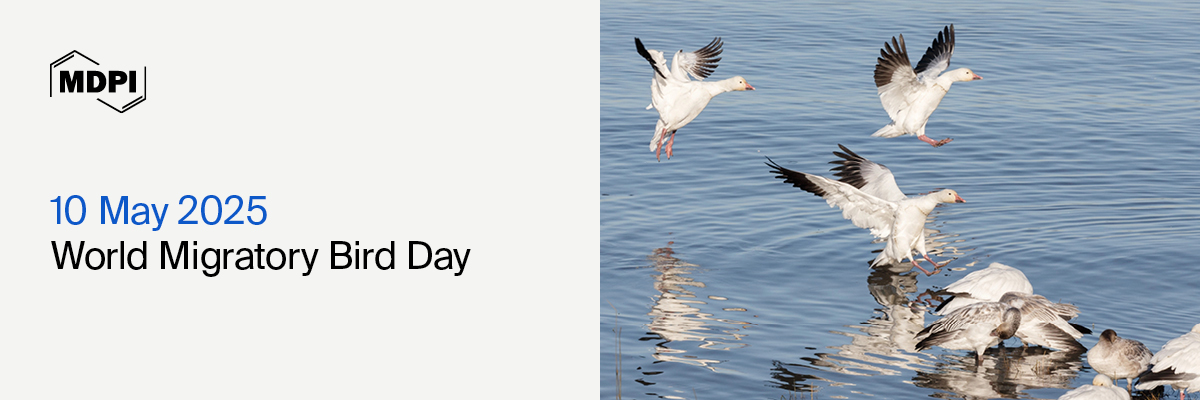
World Migratory Bird Day (WMBD) is officially celebrated on the second Saturday of May in Canada and the US, and the second Saturday of October in Mexico, Central and South America, and the Caribbean. While the official dates are set, organizations and individuals are encouraged to celebrate and raise awareness about birds throughout the year by organizing relevant events and activities.
In 2025, WMBD will raise awareness about the many challenges migratory birds face due to human activities and expanding urban development. The campaign will advocate for strategic urban planning and conservation efforts that incorporate bird-friendly practices, making sure that our communities become havens for these remarkable travelers. The 2025 theme encourages action from all sectors, including national and local governments, businesses, community groups, and individuals worldwide.
We hope that established journals in the field of Environmental & Earth Sciences at MDPI, including Animals, Biology, Birds, Conservation, Ecologies, and Wild, will provide an invaluable platform for the exchange of innovative ideas regarding making our environment safe and welcoming for birds.

 |
 |
 |
 |
 |
 |

“Birds of Game Abundances in Evergreen Forests in Calakmul Biosphere Reserve, Campeche, Mexico”
by Héctor M. J. López-Castilla, Fernando M. Contreras-Moreno, Daniel Jesús-Espinosa, José M. Méndez-Tun, Khiavett Sánchez-Pinzón, Pedro Bautista-Ramírez, Lizardo Cruz-Romo and Sandra Petrone
Wild 2025, 2(1), 3; https://doi.org/10.3390/wild2010003
“Trends in the Application of Citizen Science in Waterbird Conservation: A Bibliometric Analysis”
by Ruilin Wang and Keming Ma
Animals 2025, 15(3), 368; https://doi.org/10.3390/ani15030368
“Mitigating Acute Climate Change Threats to Reintroduced Migratory Northern Bald Ibises”
by Johannes Fritz, Markus Unsoeld, Bernhard Goenner, Regina Kramer, Lisbet Siebert-Lang and Helena Wehner
Conservation 2024, 4(4), 748-761; https://doi.org/10.3390/conservation4040044
“Quantifying the Ecological Performance of Migratory Bird Conservation: Evidence from Poyang Lake Wetlands in China”
by Zhenjiang Song, Shichao Gao, Mingni Leng, Bo Zhou and Baoshu Wu
Biology 2024, 13(10), 786; https://doi.org/10.3390/biology13100786
“Comparing Energetics and Physiological Trait Patterns of North American Birds to Support Ecological Risk Assessment”
by Erik B. Muller, Carlo Romoli, Benoit Goussen, Jonathan D. Maul, Richard Brain and Nika Galic
Ecologies 2024, 5(3), 354-367; https://doi.org/10.3390/ecologies5030022
“Use of Stable Isotopes (δ13C and δ15N) to Infer Post-Breeding Dispersal Strategies in Iberian Populations of the Kentish Plover”
by Andrea Gestoso, María Vidal and Jesús Domínguez
Animals 2024, 14(8), 1208; https://doi.org/10.3390/ani14081208
“Simulation Modeling Unveils the Unalike Effects of Alternative Strategies for Waterbird Conservation in the Coastal Wetlands of Sardinia (Italy)”
by Alessandro Ferrarini, Marco Gustin and Claudio Celada
Biology 2023, 12(11), 1440; https://doi.org/10.3390/biology12111440
“Stopover Ecology of the European Turtle Dove (Streptopelia turtur), a Threatened Migratory Bird Species, after the Crossing of an Extended Ecological Barrier”
by Christos Barboutis, Anastasios Bounas, Elisabeth Navarrete and Thord Fransson
Birds 2023, 4(2), 202-212; https://doi.org/10.3390/birds4020017
“Using Pop-GUIDE to Assess the Applicability of MCnest for Relative Risk of Pesticides to Hummingbirds”
by Matthew A. Etterson, Elizabeth A. Paulukonis and S. Thomas Purucker
Ecologies 2023, 4(1), 171-194; https://doi.org/10.3390/ecologies4010013
“Blood Metabolites and Profiling Stored Adipose Tissue Reveal the Differential Migratory Strategies of Eurasian Reed and Sedge Warblers”
by Pedro M. Araújo, Ivan Viegas, Luis P. Da Silva, Pedro B. Lopes, Ludgero C. Tavares and Jaime A. Ramos
Birds 2022, 3(4), 359-373; https://doi.org/10.3390/birds3040024

| “Unveiling the Breeding Biology and Life History Evolution in Birds” Guest Editors: Prof. Dr. Shaobin Li, Dr. Changcao Wang and Dr. Weibin Guo Submission deadline: 31 October 2025 |
“Multi-Sensor Remote Sensing and Ecological Models for Bird and Wildlife Conservation” Guest Editors: Dr. Annalisa Viani, Dr. Tommaso Orusa and Dr. Samuele De Petris Submission deadline: 30 November 2025 |
 |
 |
















